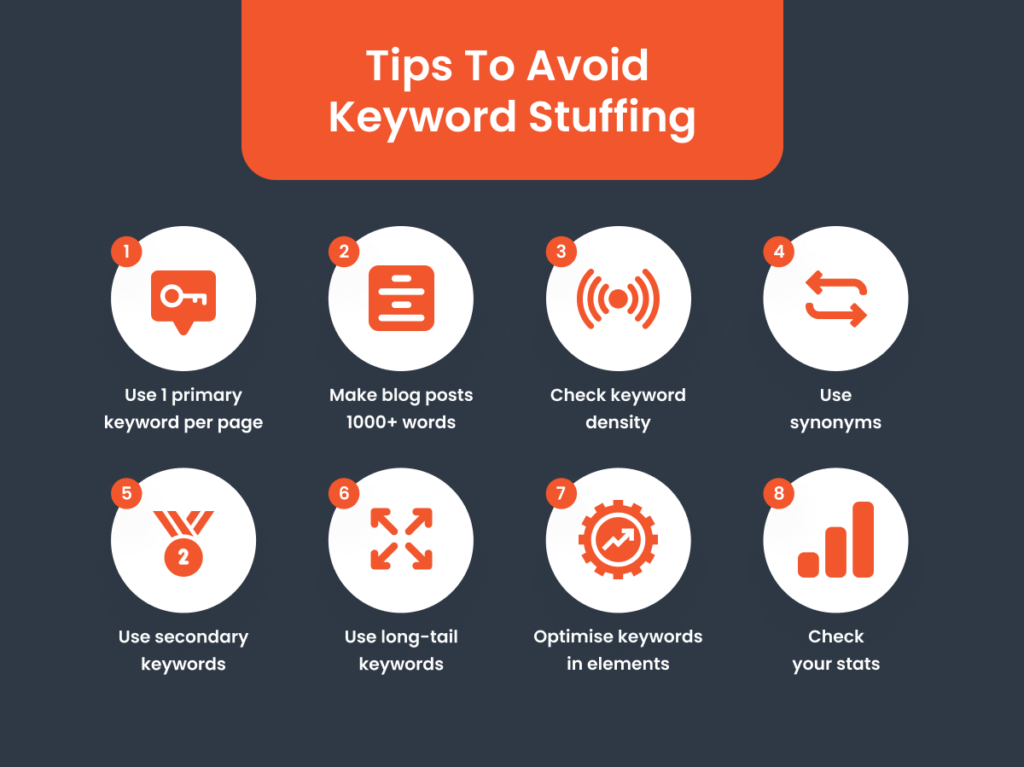Uncover the dark side of digital marketing with our in-depth exploration of keyword stuffing and its potential consequences.

Image courtesy of via DALL-E 3
Table of Contents
Introduction to Keyword Stuffing
Have you ever wondered how certain websites appear at the top of your search results when you type something into Google? Well, one of the tricks they use is called “keyword stuffing.” Let’s explore what this is all about in a simple and easy way.
What Are Keywords?
Keywords are the special words or phrases that people type into search engines like Google to find what they’re looking for. For example, if you’re searching for cute puppy pictures, “cute puppy pictures” would be the keywords you use. They help search engines understand what your content is about.
Understanding SEO
SEO stands for Search Engine Optimization, which is like a magic spell that helps websites get noticed by search engines. By using the right keywords and following certain rules, websites can climb higher up the search result ladder, making it easier for you to find what you’re looking for.
How Keyword Stuffing Works
Keyword stuffing is a sneaky way some people try to trick search engines into ranking their websites higher. But how exactly does it work?
Repeating Words
Imagine typing the same word over and over again on a webpage. That’s what keyword stuffing is all about – using the same words too many times. The goal is to make search engines think your site is super relevant to those words. But in reality, it just makes the content look messy and annoying to read.
Invisible Text
Some people go even further by hiding extra keywords on their pages. They make the text the same color as the background, so you can’t see it with your eyes. This hidden text is a big no-no because search engines can still read it. It’s like trying to cheat your way to the top of the search results, but it usually backfires.
Why Keyword Stuffing is Bad
In the previous sections, we learned about what keyword stuffing is and how it works. Now, let’s delve into why keyword stuffing can have negative consequences for both readers and search engines.

Image courtesy of via Google Images
Bad for Readers
When a website’s content is filled with the same keywords repeated unnaturally, it can make the text seem robotic and difficult to read. Imagine trying to read a paragraph where the same word is used over and over again – it would be boring and might not even make sense!
Bad for Rankings
Search engines like Google want to provide the best and most relevant results to their users. When they detect keyword stuffing on a website, it signals that the content may not be high-quality or valuable. As a result, search engines may lower the ranking of that website, making it harder for users to find.
By understanding why keyword stuffing is harmful, we can see the importance of using keywords in a natural and meaningful way. In the next section, we’ll explore how to use keywords properly to improve your website’s visibility without resorting to keyword stuffing.
How to Use Keywords Properly
When it comes to using keywords on your website, it’s essential to do it in a way that helps your website’s visibility on search engines without resorting to keyword stuffing. Let’s explore some best practices on how to use keywords the right way.
Natural Placement
Keywords should seamlessly fit into the content of your website. Instead of forcefully inserting keywords in every sentence, focus on using them where they naturally belong. Think about what words your target audience would use when searching for your content and incorporate them in a way that reads naturally.
Focus on Quality
One of the most important aspects of using keywords is to prioritize the quality of your content. Search engines like Google now value high-quality, relevant content that provides value to users. Make sure your content is well-written, informative, and engaging for your audience. When your content is valuable, you won’t need to rely on keyword stuffing to attract visitors.
Examples of Keyword Stuffing
Imagine reading a paragraph like this: “Are you looking for the best pizza in town? Our pizza restaurant offers the best pizza in town that pizza lovers adore. Visit our pizza restaurant for the best pizza in town and enjoy the best pizza experience!” This paragraph is an example of keyword stuffing, where the word “pizza” is repeated excessively to try and trick search engines into ranking the website higher for that keyword.

Image courtesy of via Google Images
Hidden Text
Another sneaky way some people try to use keyword stuffing is by hiding text in the background color of a webpage. For example, they might set the text color to white against a white background, making it invisible to the human eye but readable by search engines. This unethical practice is an attempt to deceive search engines into thinking the webpage is more relevant for those hidden keywords.
Alternatives to Keyword Stuffing
One way to improve your website’s search engine ranking without keyword stuffing is to use synonyms. Synonyms are words that have similar meanings to your main keywords. For example, if your main keyword is “delicious,” you can use synonyms like “tasty” or “scrumptious” throughout your content. This not only helps you avoid repetition but also adds variety to your writing, making it more engaging for readers.
Creating Useful Content
Instead of focusing solely on inserting keywords into your content, shift your attention to creating useful and informative articles. Search engines like Google are constantly evolving to prioritize quality content that provides value to users. By focusing on creating high-quality content that answers questions, solves problems, or entertains your audience, you can improve your SEO without resorting to keyword stuffing.
How Search Engines Detect Keyword Stuffing
Keyword stuffing may seem like a clever way to boost a website’s visibility on search engines, but search engines have become smarter at detecting this practice. Let’s dig into how search engines like Google can spot when keyword stuffing is happening.

Image courtesy of via Google Images
Advanced Algorithms
Search engines use advanced algorithms to scan websites and analyze their content. These algorithms are like detective programs designed to identify patterns and anomalies in the text. When a website has an unusually high number of repetitions of the same keyword, the algorithm raises a red flag.
Penalties
Once search engines like Google detect keyword stuffing on a website, they may impose penalties. These penalties can range from lowering the website’s ranking in search results to even removing the site altogether. Search engines prioritize delivering relevant and high-quality content to users, so they crack down on websites that try to manipulate their rankings with keyword stuffing.
The Future of SEO
As we look towards the future of SEO, it’s clear that search engines are becoming smarter. They are no longer just looking for the presence of keywords on a webpage, but they are also focusing on the quality of the content and the overall user experience. This shift indicates a move away from keyword stuffing and emphasizes the importance of creating valuable and engaging content for users.
Content Quality
One of the key trends in the future of SEO is the emphasis on content quality. Search engines are placing a higher value on well-written, informative content that provides real value to readers. Instead of focusing solely on keywords, website owners need to concentrate on crafting high-quality content that answers questions, solves problems, and offers valuable insights.
User Experience
Another important aspect of the future of SEO is user experience. Search engines are increasingly taking into account how users interact with websites and how enjoyable and easy they find the overall experience. This means that websites that are well-organized, easy to navigate, and provide a pleasant user experience will likely rank higher in search results.
Conclusion
In conclusion, keyword stuffing is a practice that involves using the same words repeatedly on a webpage in an attempt to manipulate search engine rankings. While it may have been a common tactic in the past, search engines like Google have become smarter in detecting and penalizing websites that engage in this practice.

Image courtesy of via Google Images
For those looking to improve their SEO and online presence, it is important to focus on using keywords properly and following best practices. Quality content that is both user-friendly and relevant to the target audience is key to achieving long-term success in the digital landscape.
By understanding the negative impacts of keyword stuffing and embracing alternative strategies such as using synonyms and creating informative content, websites can enhance their visibility and provide better user experiences. The future of SEO lies in prioritizing content quality and user satisfaction, paving the way for a more authentic and engaging online experience for all.
Frequently Asked Questions (FAQs)
What happens if I keyword stuff?
When you keyword stuff your website by using the same words too many times, it can actually have a negative impact on your search ranking. Search engines like Google may see this as trying to trick them and might rank your website lower on the search results page. This means fewer people will see your website when they search for something related to your content.
Can keyword stuffing get me banned?
Keyword stuffing can be risky because search engines have guidelines that websites need to follow. If you go too far with keyword stuffing and ignore these guidelines, your website could potentially get banned from search engines. Being banned means your website won’t show up in search results at all, making it hard for people to find you online. It’s always best to follow good SEO practices to avoid this risk and keep your website visible to others.







